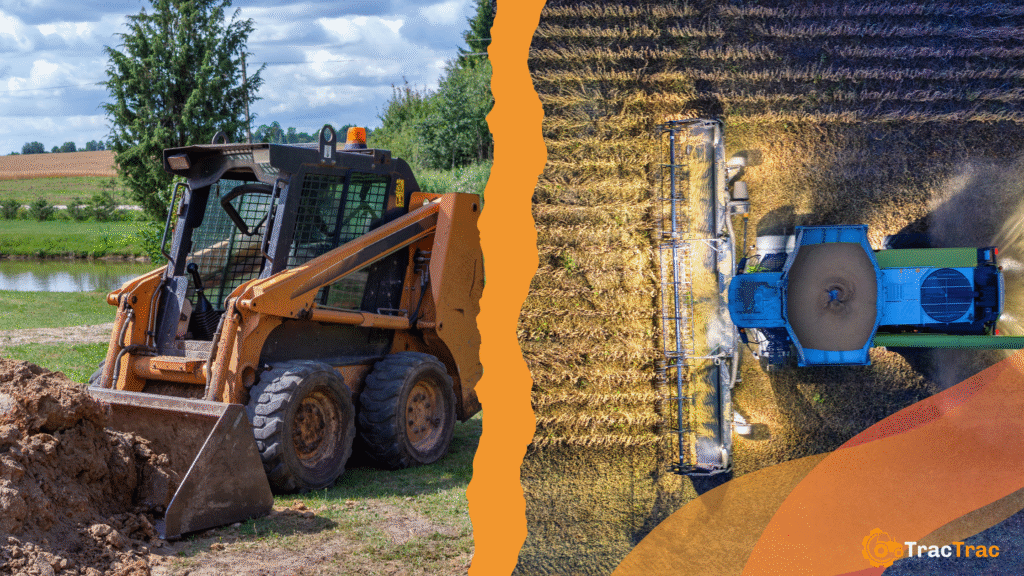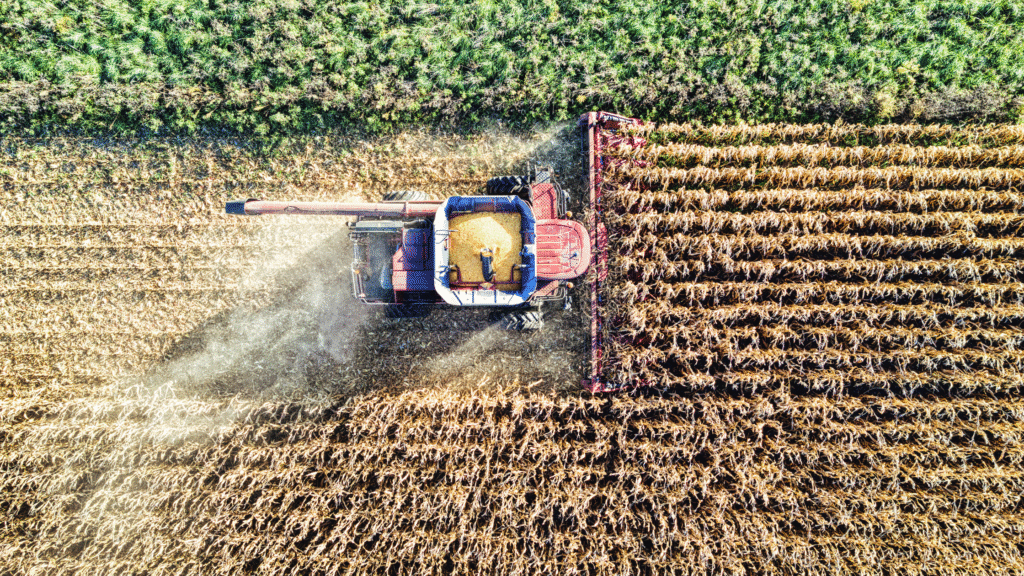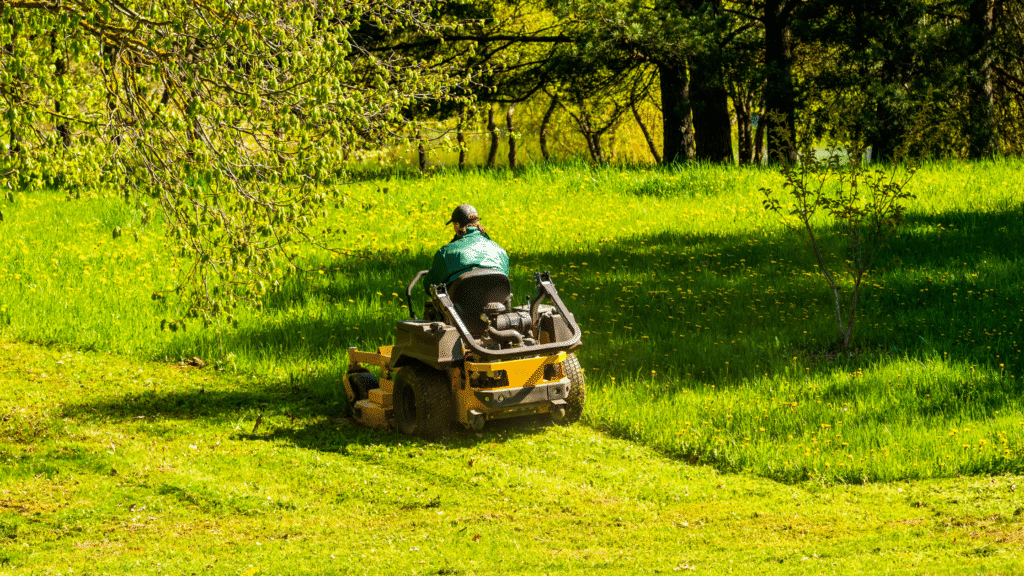
Africans can no longer afford to see farm tractors as a luxury in farming. It’s a necessity. As labor becomes more expensive and unpredictable, farmers across the globe are turning to machines to boost productivity, reduce manual workload, and meet growing food demands.
In fact, the Food and Agriculture Organization (FAO) of the United Nations emphasizes that agricultural mechanization is a key driver of sustainable food production, especially in low- and middle-income countries where smallholder farmers form the backbone of the food system.
But investing in mechanization isn’t just about owning equipment, it’s about choosing the right one. And when it comes to tractors, the decision between a farm tractor and a mini tractor can be a game-changer.
Get it wrong, and you could end up with a machine that’s too big for your land, too costly to maintain, or underpowered for your needs. Get it right, and you’ll see better fuel efficiency, reduced downtime, and faster field operations all contributing to a healthier bottom line.
In this article, we break down the differences between farm tractors and mini tractors to help you make a smart, informed choice that fits your land, budget, and long-term goals.
What is a Farm Tractor?
A farm tractor is a powerful, heavy-duty vehicle designed to perform a variety of agricultural tasks on large farms. It’s the workhorse of modern mechanized farming, built to handle demanding operations like ploughing, harrowing, tilling, planting, and hauling equipment over extensive farmland.
Typically, farm tractors come with an engine power range of 40 horsepower (HP) and above, with many commercial models exceeding 100 HP. This high horsepower allows them to operate large implements such as disc ploughs, rotary tillers, seed drills, and heavy trailers with ease. Their larger size also provides more stability and traction on uneven terrain, making them ideal for rough, expansive farmlands.
Beyond brute strength, farm tractors often include advanced features like four-wheel drive (4WD), power take-off (PTO) systems, hydraulic lifts, and enclosed cabs for operator comfort. These features make them highly versatile and durable, perfect for farmers who manage large farms and require consistent, high-capacity performance throughout the growing season.
Common Uses of a Farm Tractor in Large-Scale Agriculture
- Deep ploughing and soil preparation
- Towing large implements across wide fields
- Seeding and planting crops on a mass scale
- Operating combine harvesters and sprayers
- Transporting heavy loads such as harvested crops or farm inputs
In essence, if you’re looking for a tractor for a big farm or a long-term investment that can support intensive crop production, a full-sized farm tractor is your go-to machine.
Also Read: Understanding Tractor Horsepower: How does it affect performance?
What Is a Mini Tractor?
A mini tractor, also known as a compact tractor, is a smaller and lighter version of the traditional farm tractor. It’s specifically designed for small farms, gardens, orchards, and tight field spaces where maneuverability and efficiency matter more than brute strength.
These tractors typically fall within the 15–35 horsepower (HP) range, making them ideal for light to moderate agricultural tasks. While they may not have the raw power of farm tractors, mini tractors shine in areas where precision and flexibility are essential such as weeding between rows, spraying in orchards, or preparing garden plots.
The design of a mini tractor focuses on simplicity and versatility. Many models come with basic hydraulic systems, PTO shafts, and easy-to-use controls, making them accessible to both experienced farmers and beginners. Some are even designed to fit into narrow rows of vegetables or fruit trees without damaging crops. This is a major advantage for orchard and horticulture farmers.
Common Uses of a Mini Tractor
- Tilling small plots and garden beds
- Spraying pesticides and fertilizers in orchards
- Hauling light loads (e.g., produce, water, manure)
- Seeding, weeding, and mowing
- Landscaping and lawn care
If you’re running a tractor for a small farm, a mini tractor offers a cost-effective, low-maintenance option that’s perfect for daily farm operations without the complexity of a larger machine.
Side-by-Side Comparison: Farm Tractor vs. Mini Tractor
When choosing between a farm tractor and a mini tractor, it’s essential to evaluate your specific needs from land size to crop type and budget. Here’s a mini vs full-size tractor comparison to help you weigh your options quickly.
| Feature | Farm Tractor | Mini Tractor |
| Horsepower | 40 HP and above | 15–35 HP |
| Size and Weight | Large, heavy-duty frame | Compact and lightweight |
| Types of Farm Implements Supported | Supports heavy-duty implements like ploughs, rotavators, seed drills | Supports lighter tools like tillers, sprayers, and cultivators |
| Fuel Efficiency | Higher fuel consumption due to power output | More fuel-efficient for small tasks |
| Cost of Purchase | Higher upfront investment | Lower cost; more budget-friendly |
| Maintenance Requirements | Requires more technical servicing and spares | Easier and cheaper to maintain |
| Ideal Land Size | Suitable for 5+ hectares or commercial farms | Best for 1–5 hectare plots, gardens, and orchards |
| Terrain Suitability | Handles rough, uneven, or large tracts of land | Ideal for flat, small fields or tight row crops |
This side-by-side overview makes the difference between a farm and mini tractor clearer: the former is built for power and scale, while the latter thrives on simplicity, agility, and lower running costs.

Factors to Consider When Choosing a Tractor
Buying a tractor is a big decision, and it’s not just about the brand or horsepower. The right choice depends on your farm’s specific needs and making the wrong choice can cost you time, money, and productivity.
Here are the key factors to consider when choosing a tractor that’s right for you:
- Farm Size and Terrain
If you manage a large farm with uneven or rugged land, a full-size farm tractor with high horsepower and heavy-duty tires is more suitable. For smaller plots, flat terrain, or row-based farms like orchards and gardens, a mini tractor can offer more maneuverability and efficiency.
- Type of Crops Grown
Row crops (like maize or tomatoes) may need a compact tractor that can move between rows without damaging plants. On the other hand, crops that require deep tilling or heavy-duty planting (like cassava or yams) might be better supported by a larger farm tractor.
- Budget
Your budget is one of the biggest decision drivers. A mini tractor is generally more affordable in terms of both purchase price and operating costs. If you have a limited budget and operate a small farm, this could be your best starting point. But if you’re scaling and want a long-term investment, a full-size tractor could offer better returns.
- Storage and Accessibility
Where will you store the tractor? Do you have sheds, garages, or covered spaces? A mini tractor takes up less room and is easier to maneuver into tight storage areas especially important for urban or peri-urban farms.
- Operator Experience
If you’re new to mechanized farming or don’t have trained operators, a mini tractor may be easier to handle. Many models are beginner-friendly and come with simple controls. Meanwhile, full-size tractors often require trained hands to operate safely and effectively.
- Fuel and Spare Parts Availability in Your Region
Before buying any machine, make sure fuel and spare parts are readily available in your area. Some imported models may look attractive but can quickly turn into expensive liabilities if parts are hard to find.
Who Should Use a Farm Tractor?
If your farm operation is large-scale and power-intensive, a farm tractor is likely the right fit. These machines are built for tough jobs and continuous use making them ideal for those who need to cover more ground, work longer hours, and handle heavy implements.
So, who should use a farm tractor?
1. Commercial Farmers
If you’re growing crops on 5 hectares or more, especially grains, tubers, or cash crops, a farm tractor offers the horsepower needed for deep plowing, large-scale planting, and hauling. It’s the go-to machine for maximizing productivity across big fields.
2. Mechanization Service Providers (MSPs)
MSPs often provide tractor services to smallholder farmers who can’t afford their own equipment. For MSPs, owning a full-sized farm tractor means you can take on more clients and offer diverse services like soil preparation, harrowing, seeding, and post-harvest operations. The durability and power of a standard tractor make it a smart investment.
3. Farmer Cooperatives or Clusters
In farming communities where groups of farmers pool resources, a shared farm tractor is a smart choice. It can serve multiple farms, reducing individual costs while boosting collective output. Cooperatives involved in structured farming (e.g., contract farming or irrigation schemes) will benefit from a versatile, powerful machine.
Best Scenarios for Using a Farm Tractor
- Plowing or harrowing large fields
- Planting and harvesting on a commercial scale
- Hauling trailers, water tanks, or heavy implements
- Managing multiple farm plots or expansive terrain

Who Should Use a Mini Tractor?
For farmers managing smaller plots or operating in tighter spaces, a mini tractor is often the most efficient and cost-effective choice. These compact machines are versatile, easy to operate, and require less fuel making them ideal for light-duty farm work and targeted mechanization.
So, who should use a mini tractor?
1. Smallholder Farmers
If you’re farming on 1 to 5 hectares, a tractor for small farm tasks like land preparation, planting, and weeding should be compact, maneuverable, and economical. Mini tractors can handle most of the essential work without the bulk or fuel demands of a full-sized machine.
2. Urban and Peri-Urban Farmers
Farming in or around cities often means working with limited space. Whether it’s backyard gardens, rooftop farms, or small plots, mini tractors shine in environments where larger tractors simply won’t fit.
Best Scenarios for Using a Mini Tractor
- Row cropping where narrow spacing is critical
- Orchard and vineyard management, especially in fruit farming
- Small-scale tilling and soil preparation for vegetables and herbs
- Spraying, fertilizing, and light-duty hauling in confined spaces
In conclusion
When it comes to choosing the right tractor, there’s no one-size-fits-all answer. It all depends on your farm’s size, terrain, budget, and what you plan to achieve.
Let’s recap the key differences:
| Category | Farm Tractor | Mini Tractor |
| Horsepower | 40 HP and above | 15–35 HP |
| Best For | Large-scale, commercial farming | Small farms, gardens, orchards |
| Fuel Use | Higher fuel consumption | More fuel-efficient |
| Cost | Higher upfront investment | Budget-friendly |
| Operator Needs | Trained personnel | Easier to operate |
If you’re managing a large commercial farm, offering mechanization services, or leading a farming cooperative, a farm tractor offers the durability and power to scale operations.
If you’re a smallholder farmer, urban grower, or a young person getting into agriculture, a mini tractor gives you a compact, efficient tool to grow your farm sustainably.
Need Help Making the Right Choice?
Mechanization is an investment. And like all good investments, it’s worth getting expert advice. We recommend:
- Speaking with a farm mechanization expert.
- Visiting a local agricultural equipment dealer for a hands-on demo.
- Exploring financing options through cooperatives or development programs.
The right tractor isn’t just a machine, it’s a step toward higher yields, lower labor costs, and a more productive future.
Frequently Asked Questions
Can a mini tractor be used for ploughing?
Yes, a mini tractor can be used for ploughing, especially on small plots of land with soft to moderately hard soil. Many compact tractors support light-duty ploughs, rotavators, and harrows. However, if you’re working with heavy clay soils or large fields, a full-sized farm tractor is more efficient and durable for the job.
Are mini tractors cheaper to maintain?
Absolutely. Mini tractors are generally cheaper to maintain than larger farm tractors. They consume less fuel, have fewer mechanical complexities, and often use smaller, more affordable spare parts. For farmers on a tight budget or operating on small-scale farms, their low maintenance cost is a big plus.
Which is better for vegetable farming?
For vegetable farming, especially in row-based planting systems, a mini tractor is often the better choice. Its compact size and maneuverability make it ideal for narrow beds and inter-row cultivation. You can attach tools for tilling, seeding, weeding, and spraying without damaging your crops.
How much land justifies buying a farm tractor?
A farm tractor becomes a justifiable investment when you manage 5 hectares (about 12 acres) or more, especially for cereal crops, commercial-scale production, or contract farming. The larger the land, the more cost-effective a high-powered tractor becomes due to time, labor, and efficiency gains.
